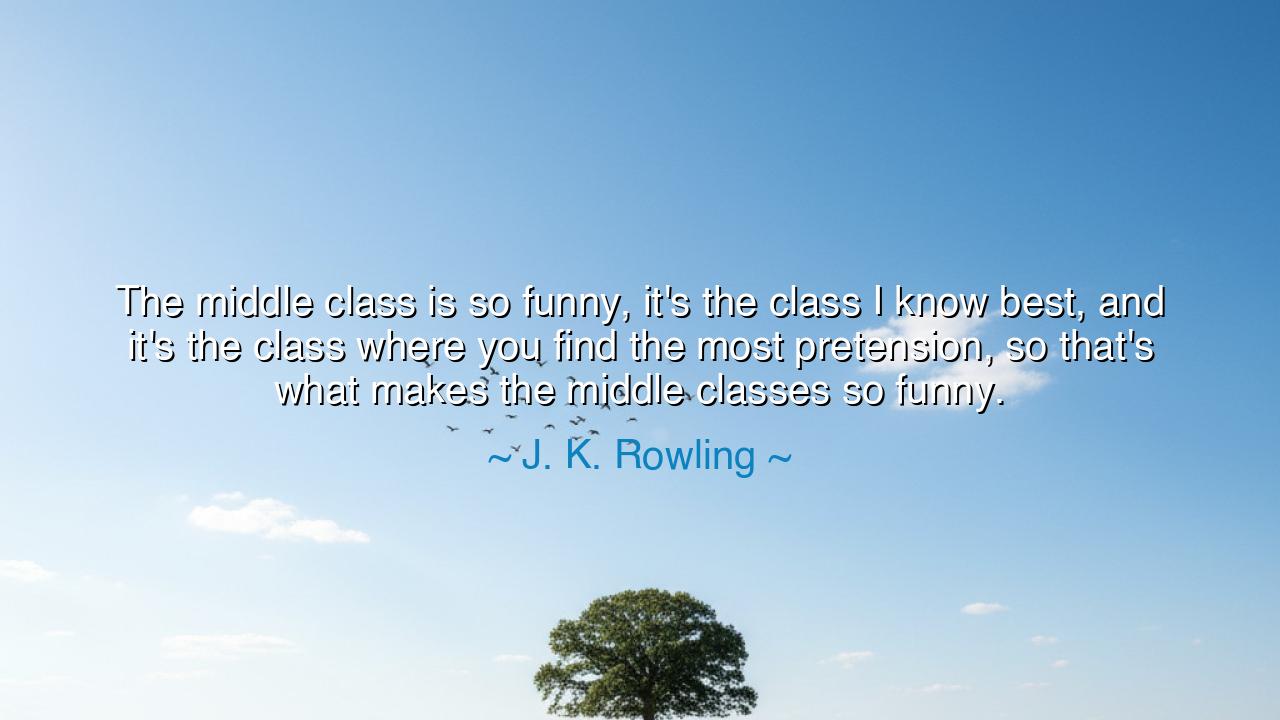
The middle class is so funny, it's the class I know best, and
The middle class is so funny, it's the class I know best, and it's the class where you find the most pretension, so that's what makes the middle classes so funny.






The great storyteller J. K. Rowling, who rose from hardship to shape the dreams of a generation, once said, “The middle class is so funny, it's the class I know best, and it's the class where you find the most pretension, so that's what makes the middle classes so funny.” In this reflection lies not mockery, but wisdom wrapped in laughter — a truth as ancient as civilization itself. For every society, from Rome to our own day, has been built upon the heart of the middle class — the strivers, the dreamers, the imitators of grandeur, caught between want and abundance. They are the bridge between hunger and wealth, and it is upon this bridge that humanity’s most comic and tragic dances take place.
To understand this pretension that Rowling speaks of, one must first look with compassion. The middle class, unlike the poor, are not bound by necessity, nor are they, like the rich, freed by plenty. They dwell in the restless realm of aspiration, where appearances matter, where reputation is currency, and where dreams often outsize means. It is in this space — neither low nor high — that the soul is tested most fiercely. The laughter that arises from their folly is not cruel laughter, but the laughter of recognition, for in their striving we see ourselves. For who among mortals has not once pretended to be more than they are, hoping the act would summon the truth?
The ancients saw this same folly mirrored in their own societies. In Athens, the merchant who grew rich from trade would don the cloak of the philosopher, quoting verses he did not understand. In Rome, freedmen who had once been slaves built grand villas, commissioning poets to sing of virtues they scarcely practiced. And yet, it was from these very people that civilization renewed itself — for their imitation of the noble sometimes led them to genuine nobility. Their pretension was, in truth, a yearning for beauty, for meaning, for belonging. That is why Rowling’s laughter is not the laughter of scorn, but of affection; it is the laughter of one who sees both the vanity and the hope intertwined.
Consider also the story of Molière, the French playwright, who centuries before Rowling, found endless inspiration in the pretensions of the bourgeoisie. His comedies — The Bourgeois Gentleman, Tartuffe — painted the middle class as both foolish and profoundly human. The merchant who pretended to be an aristocrat, the hypocrite who preached virtue while seeking favor — these were not monsters, but mirrors. And in laughing at them, audiences laughed at their own masks. For as Molière knew, as Rowling knows, humor is the sword that reveals truth without spilling blood.
What makes the middle class so funny, then, is not only their vanity, but their visibility. They are the beating heart of culture, the measure of what society values. When they chase luxury, the age becomes shallow. When they chase learning, the age grows wise. Their mimicry is both weakness and potential, both foolishness and foundation. The laughter they provoke is not meant to destroy, but to awaken. For laughter, when born of understanding, purifies; it humbles without humiliating, and teaches without preaching.
And so, Rowling’s insight is more than social observation — it is a parable. She herself came from that world: the world of tight budgets, cautious dreams, quiet pride. She knew its insecurities, its longings. And she saw how, when the middle class pretends, it is not only to deceive others but to protect its dignity, to build a story of worth in a world that often measures value by status. Her humor, therefore, is merciful — a reminder that even in our posturing, we reveal our hunger for light.
Let the lesson be thus: Laugh at pretension, but not with cruelty. Recognize it as the shadow of aspiration, the sign of a heart that wishes to rise. Let laughter guide you not to contempt, but to clarity. Be honest in your striving, humble in your success, and gentle toward those who stumble in theirs. The middle path — between pride and shame, between wealth and want — is where most of humanity walks. And it is there, in that narrow road, that we learn compassion for the follies of others, and forgiveness for our own.
So, dear listener, when you hear the laughter of the wise upon the follies of the middle class, do not mistake it for ridicule. It is the laughter of the gods — the laughter that heals, that teaches, that reminds us all: to be human is to reach upward, even clumsily, even foolishly. For in that striving, in that beautiful pretension, lies the spark of progress — the spark of every dream ever dreamed by those who refused to stay small.






AAdministratorAdministrator
Welcome, honored guests. Please leave a comment, we will respond soon